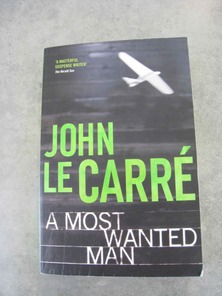Thursday, 27 November 2008
 The publication of a new Le Carre novel used to be something to look forward to.
The publication of a new Le Carre novel used to be something to look forward to.
It still is, but time was that we learnt about the impending publication through newspapers or some other section of the mainstream media. The first I heard of A Most Wanted Man’s existence was a phone call from The Actor, who’d spotted it in a piece of junk mail from Big W.
There’s some significance in that, but I’m not sure what the significance is because I wouldn’t have thought that tightly written suspense novels without a lot of physical action were likely to be a staple of a discount retailer’s clientele.
Or maybe the world has changed in ways that have so far escaped my notice.
Tthe end of the Cold War could, as some suggested at the time, have left someone like Le Carre short of subject matter. But human nature remains human nature and information is still information however much the format has changed, so there will always be a demand for the agents who form a substantial slice of Le Carre’s leading characters.
Gunther Bachmann and Erna Frey are German intelligence operatives still working in the old manner, recruiting agents through persuasion, blackmail, coercion or whatever other means will suffice to add a new source of information to a network.
So when Issa Karpov, who may or not be the illegitimate offspring of a KGB Colonel and a teenage Chechen girl, finds refuge in the home of a teenage Turkish boxing champion and his widowed mother en route to claiming the fortune his late father laundered through a seemingly-respectable merchant bank there’s an opportunity for them to use him to turn a respected scholar, providing them with access to the innermost circles of the Islamic community.
That’s their agenda, anyway.
For his part, Issa harbours an ambition to study medicine, Annabel Richter (the lawyer who ends up looking after his case) wants to atone for past failures and deportations by succeeding this time and Tommy Brue (the banker who’s holding the money) wants Annabel.
Outside that little circle of central characters are the security organisations and intelligence agencies that concern themselves with threats to our safety and well-being while advancing their own agendas and interests.
Predictably, Issa attracts their attention. He is, after all, wanted by the authorities in Russia and Turkey and has escaped detention in Sweden and Denmark before arriving in Hamburg, where the others are gradually drawn in to orbit around him, and as that happens their courses are tracked by Bachmann, Frey and the other agents of authority.
That raises an increasing cause for concern - the sheer amount of detail that has been accumulated by the security cameras that monitor our downtown streetscapes. They’re not all-seeing yet, which allows Annabel to spirit Issa away to a relatively secure location while the negotiations about his future proceed in what she assumes to be a secure environment. She’s wrong on that front, of course, and when Bachmann and Frey spring their trap she doesn’t have a great deal of choice when it comes to playing along.
Given the environment they’re working in, Bachmann and Frey don’t have much choice when it comes to sharing information so that the activities of the various organisations and agencies can be (more or less) coordinated. There is, however, the question of whether those activities are actually operating in something like synchronicity or whether they’re only being allowed to proceed as far as shadowy figures in the higher socio-political echelons are willing to allow.
That seems to be a theme running through Le Carre’s recent work, and this latest volume, arguably among the very best of an extraordinarily high-standard body of writing, raises some very worrying questions. Possibly, given the listing in an item of Big W junk mail, those questions will be raised among an increasingly wide readership.